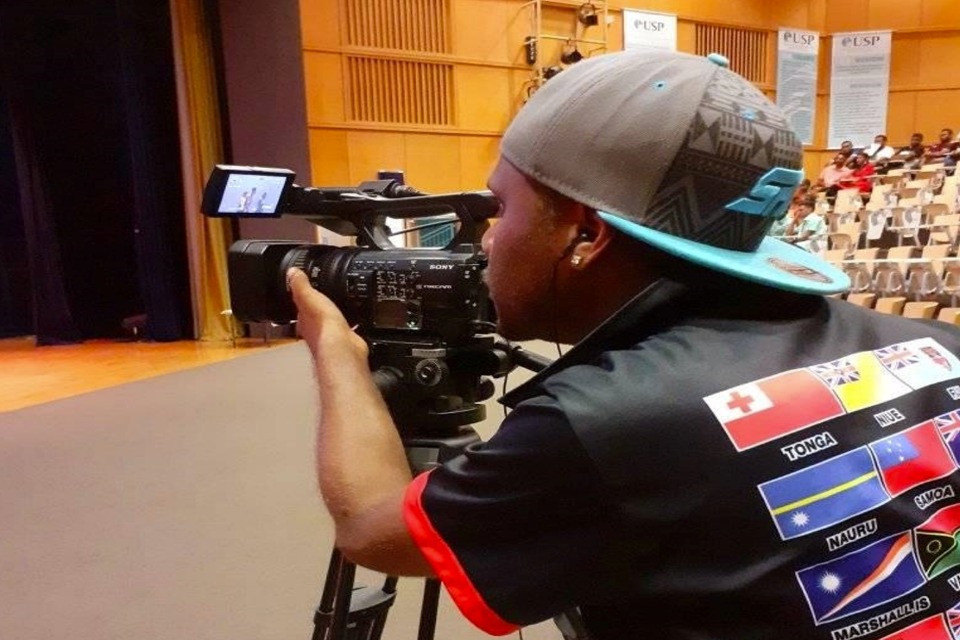Australia, the US and their partners need to engage with local media in the Pacific

US Vice President Kamala Harris appeared virtually at the Pacific Islands Forum leaders’ summit in July to announce a new wave of US assistance to
‘significantly deepen’ US re-engagement in the region. But if Harris made waves in Suva, there was barely a ripple by the time the news spread across the vast ocean to the outer islands of Pacific countries.
If the US and the other members of its
Partners in the Blue Pacific initiative—Australia, Japan, New Zealand and the UK—are to have an impact, they need to better understand online and social media information flows so they can speak to, understand and demonstrate that they’re meeting the priorities of the region.
Partners in the Blue Pacific is supposed to be an inclusive, informal mechanism to enhance cooperation in support of Pacific island priorities. But the partners also need to invest time and energy in communicating what assistance is actually being delivered, and they need to do it in a way that reaches and makes sense to Pacific people.
The recent Pacific Islands Forum summit was an example of a prime messaging opportunity that didn’t reach its full potential.
Initially, the chair of the forum, Fijian Prime Minister Frank Bainimarama,
uninvited all 21 of its dialogue partners—including China, Japan, the UK and the US—in an attempt to stop geostrategic competition from distracting Pacific leaders from their core agenda.
But on the third day of the event, Harris announced her administrations new plans, which include tripling funding for economic development and ocean resilience in the Pacific to US$60 million a year for 10 years, establishing new embassies in Tonga and Kiribati, and re-establish a USAID regional mission in Suva.
The US announcement didn’t get the traction it deserved with the broader population through online media. It’s not the first time that has happened. Unfortunately, it also won’t be the last.
That’s because the countries that make up the Partners in the Blue Pacific don’t always tell the story right.
Storytelling is an essential part of Pacific island cultural knowledge and information sharing. More needs to be done to engage local media and to help tell the story of how aid, assistance and improving people-to-people links affects each country, island or group.
In an ASPI study of news and social media in the Pacific over the two weeks when the meetings in Suva were taking place, our analysis showed obvious differences between locally written and US-origin articles. The study used a simple categorical sentiment analysis of relevant social media comments that are targeted at foreign countries or local governments. Each comment was categorised as either positive or negative.
Articles written in the US resulted in a positive-to-negative comment ratio of 0.25. That means that for every positive comment there was about the US announcements, there were four negative ones.
For articles written locally, the ratio was 1.27. So, for the same four negative comments, there were just over five positive ones.
This comes from a relatively small sample size, however. There were only 459 Facebook comments in total across 171 articles reporting on the forum. Around 10% of comments were focused on the US, aligning with the 12% of articles that focused on the US announcements.
Regardless, the benefits of engaging local media are obvious. Only half of the articles on the US assistance announcements were produced by local journalists. The US announcements and geostrategic competition in the region were the topics with the lowest percentages of locally written articles emerging from the forum.
Finally, if the US and its partners needed one more reason to engage local media, they could look towards the Chinese Communist Party’s failed attempts to push narratives of
American militarism and
Australian paternalism in the region.
During the two-week collection period for this study, we identified 20 editorials in CCP state media relating to the Pacific Islands Forum, pushing a combination of pro-CCP propaganda and anti-Western narratives.
Highlighting how these narratives—written and published in China—lack relevance to the region, only one article attracted more than a handful of comments in Pacific island public Facebook groups. In this small sample, Pacific islanders consistently expressed scepticism and resentment of foreign interference in their affairs.
The population’s visible frustration with Chinese messaging online, as determined by our sentiment analysis, is echoed by Pacific leaders offline. The forum’s secretary-general, former Cook Islands prime minister
Henry Puna, outlined the importance of listening to Pacific voices when he said, ‘If anybody knows what we want, what we need, and what our priorities are, it’s not other people, it’s us.’
The next test for Pacific partners will come this weekend when the new US ambassador to Australia, Caroline Kennedy,
visits Solomon Islands.
In May, Chinese Foreign Minister Wang Yi failed his test when a press conference he held in Honiara was
boycotted by Solomon Islands journalists who claimed that the CCP was ‘impeding on democratic principles’ when it sought to limit access and questions.
The US wouldn’t ever make that mistake, but it can still do more to engage local media—for example, by giving exclusive interviews to members of the Solomons’ media association. Following the recent
tightening of government control over the Solomon Islands Broadcasting Corporation, giving power to the local voice has never been so important. And it is the local voice that will be integral to how the US is perceived and understood in Solomon Islands.
 Print This Post
Print This Post